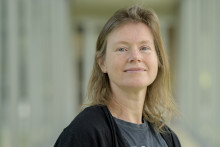This assessment was carried out by the so-called building block cluster ‘Futureproof Education’. The motivation is to make UT education more cost-efficient in light of budget cuts. One part of this effort is a mandatory budgeting assignment for each study programme. Work on this is currently underway, says cluster lead Felix van Urk (Strategy & Policy). ‘Almost all programme directors have calculated the costs for their programmes. In the coming period, we’ll fine-tune this with them, the education portfolio holders, and the Finance department. We aim to specify as clearly as possible what a programme costs, though this is naturally nuanced. Ultimately, the goal is for this mandatory budget to provide direction for each programme.’
‘Not TOM 2.0, But the Number of courses’
Van Urk shares some initial findings from the analysis. ‘We found no financial reason to conclude that the Twente Education Model 2.0 is inefficient. Nor did we identify any extremely inefficient educational practices. One might expect disproportionate pressure in the form of exams and assessments in some areas, but that turned out not to be the case.’
What did stand out, according to Van Urk, was the sheer number of courses. ‘We offer a very large number of courses, and many of them are not cost-effective. To put it more sharply: a significant portion of the courses within our education system is not financially sustainable.’
Responsibility of Faculties and Programmes
Van Urk, head of the education cluster, cautions against drawing premature conclusions. ‘Just because a course isn’t financially profitable doesn’t mean it’s not worth offering. That’s primarily a content-based decision. But it is something that programmes can take into consideration.’
Ultimately, it’s up to the programme and faculty to decide how education is offered, Van Urk says. ‘It may be that a course doesn’t need to change. In other cases, courses might be merged or shared across multiple programmes. These decisions should be made at the programme and faculty level—not centrally at UT.’
Rethinking Funding
Van Urk does believe the time is right to have a broader discussion this autumn about how UT programmes are funded. ‘A relevant question is whether we want to continue viewing programme funding per faculty or as something that belongs to UT as a whole.’
‘With a bit of luck’ Van Urk hopes to have a clear picture by the end of this calendar year of how UT programmes can best calculate their cost structures. He also hopes to present other plans and recommendations by then, to make education more efficient.






